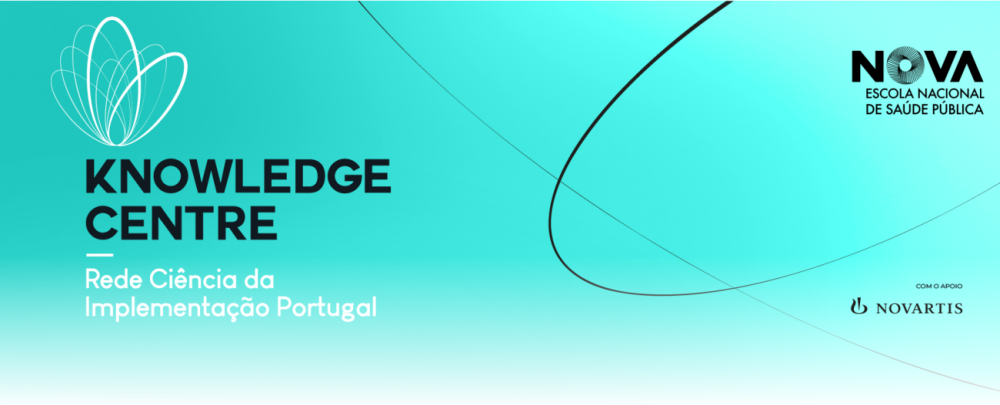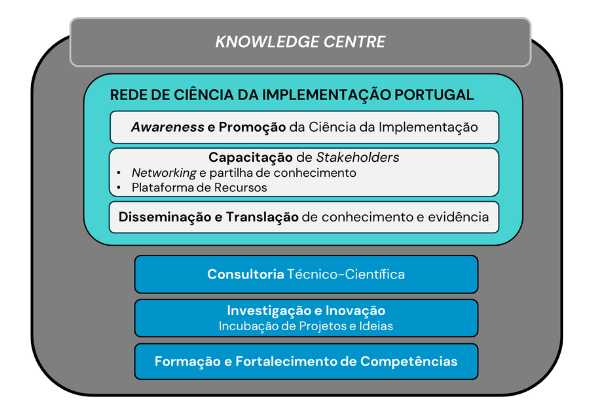
The creation of a Knowledge Center in Implementation Science intends to fill the gap between the advancement of scientific knowledge and its practical application, identifying barriers and facilitators to the integration of innovation in health care and developing strategies for its effective adoption. Through a multidisciplinary approach, it analyzes and optimizes the operationalization of evidence-based policies and interventions in the real world, which contributes to improving the impact on the health of the population, reducing costs, increasing efficiency and reducing inequalities.
This field of study plays a crucial role in facing complex challenges, promoting sustainability and the optimal use of available resources, essential for more equitable and resilient health systems.
The efficiency of health interventions depends on the integration between knowledge about what works (or not) and the ability to transform this knowledge into concrete, contextualized and realistic actions. In this sense, the Implementation Science Center will optimize the translation of evidence into public health policies and practices, with the aim of strengthening health systems and improving the well-being of populations in an efficient, equitable and sustainable way.
In addition, this Center will promote the articulation between different sectors and disciplines, through a collaborative and dynamic network, which involves both the health sector and the social sector – ensuring that the interventions are not only scientifically based, but also executable and with a measurable impact.
Implementation Science is an area of knowledge with a multidisciplinary approach, which aims to transform scientific evidence into effective policies, programs and interventions in real scenarios. Implementation Science seeks to understand the reason behind some interventions working in certain contexts and, at the same time, failing in other situations, developing strategies to overcome barriers, identify facilitators and maximize results.
Through a multidisciplinary approach, it analyzes and optimizes the operationalization of policies and evidence based interventions in the real world, which contributes to improving the impact on the health of the population, reducing costs, increasing the quality of care and its efficiency, as well as reducing inequalities. This field of study plays a crucial role in facing complex challenges, promoting sustainability and the optimal use of available resources, essential for more equitable and resilient health systems.
Fundamental Components:
1. Adaptation of Interventions:
Interventions developed in controlled environments do not always work in the real world. Implementation Science identifies how to adapt these interventions to the cultural, social and economic needs of each community, focusing on their effectiveness.
2. Barriers and Facilitators:
Barriers include resistance to change, inadequate training and lack of resources. Facilitators can be diverse, such as community involvement, institutional support and adequate infrastructure.
3. Models, Frameworks and Strategies:
Models and frameworks guide implementation strategies, providing a basis for evaluating and adjusting practices over time.
4. Continuous Evaluation:
The implementation is not a single event, but a continuous and participated process. Monitoring and adjusting strategies ensures the effectiveness and sustainability of interventions in the face of contextual changes that always happen, especially in complex and extensive processes.
Why is it important?
The National School of Public Health of the NOVA University of Lisbon (NOVA NSPH) created this Knowledge Center to lead the application of Implementation Science in Portugal.
Mission:
Approach:
The center operates in four main areas to ensure the application of evidence-based interventions:

1. Professional Training:
2. Technical-Scientific Consulting:
3. Dissemination of Knowledge:
4. Creation and Dynamization of the Portuguese Implementation Science Network:
The center has several areas of knowledge transversal to the axes of action, namely:
The Portuguese Implementation Science Network is a Knowledge Center initiative that connects institutions, professional organizations and citizens around a common goal: to facilitate the implementation of evidence-based policies and practices.
Who Participates? Public and private health institutions; Municipalities and local communities; Academy and Research; Health professionals; Health care institutions; Managers and policy makers; Professional Associations; Civil society organizations.
This Network’s main mission is to promote Implementation Science in Portugal. It intends to connect people, groups, networks and organizations, enhancing the strengthening of skills and promoting collaboration and sharing of experiences and ways to integrate Implementation Science in the different contexts of action of network members. It also intends to strengthen the dissemination and translation of knowledge and evidence, in practices with impact and sustainability.

This Center also has the partnership of the Clinical Academic Centers.
Sónia Dias (Coordinator)
Marta Marques (Co-coordination)